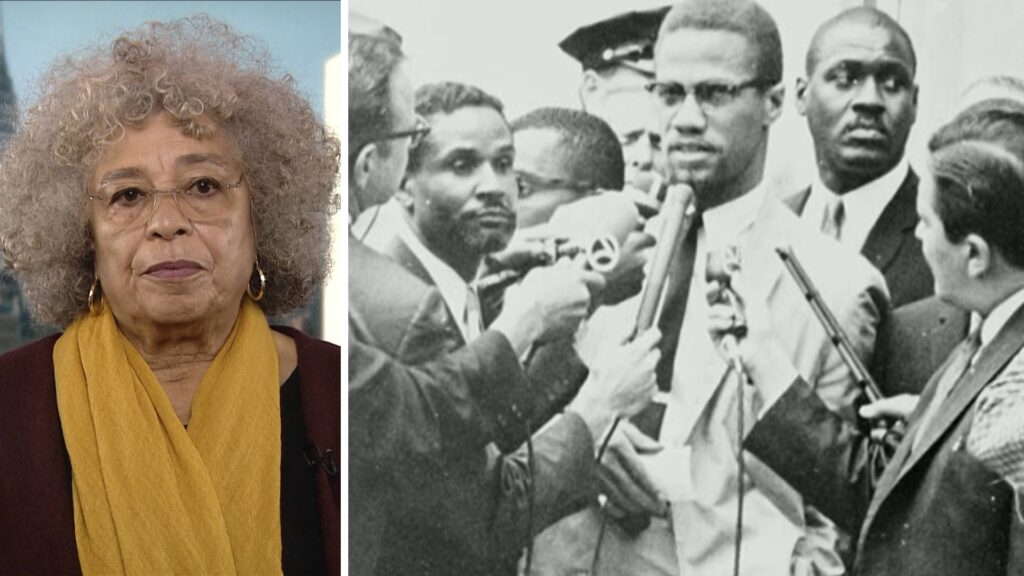[We speak with renowned scholar and activist Angela Davis on the 58th anniversary of the assassination of Malcolm X. Davis says Malcolm is still vital to understanding racism, power and justice in the United States and beyond. She also responds to recent moves by Florida Governor Ron DeSantis and others to restrict the teaching of African American history, calling it an effort to “turn the clock back” on racial progress. Transcript.]
❈ ❈
AMY GOODMAN: This is Democracy Now! I’m Amy Goodman, with Juan González.
Fifty-eight years ago today, on February 21st, 1965, Malcolm X was shot dead as he spoke at the Audubon Ballroom in Harlem. He had just taken the stage, began speaking, when shots rang out, riddling his body with bullets. Malcolm X was 39 years old, just like Martin Luther King three years later when he was assassinated, 39 years old.
We spend the rest of the hour today looking at a life and legacy of Malcolm X with the renowned activist and scholar Dr. Angela Davis, who is giving a keynote address tonight at the Shabazz Center, the site of the Audubon Ballroom in Harlem, where Malcolm X was assassinated, as the center launches a new Malcolm X education curriculum.
Angela Davis, welcome back to Democracy Now! It’s great to have you with us and have you in New York City. Talk about the significance of this day 58 years ago, Malcolm X gunned down.
ANGELA DAVIS: Well, first of all, thank you, Amy, for inviting me to spend some time reflecting on the legacy of Malcolm X on this day, his birthday [sic].
Well, unfortunately, Malcolm has been relegated to the position of pretty much being the opposite of Martin Luther King. We know King as the advocate of nonviolence. We know Malcolm as the militant, the revolutionary. And I think it’s important to think more deeply about the legacy of Malcolm X, to think, for example, about his internationalism.
One of the problems we confront in this country is the kind of U.S.-centric position of so many in the issues that we address, in the ways that even activists, even radical activists tend to look at the U.S. as the center of the world. Malcolm emphasized human rights as opposed to simply civil rights, because he argued it was not simply a question of this particular nation-state, it was about the world. It was about Africa. It was about Latin America. It was about Asia. He very specifically emphasized the importance of Afro-Asian solidarity in connection with Bandung. So there is so much that we can learn from reflecting on the legacy of Malcolm X. Especially now we need to pay attention to the way in which he insisted on support and solidarity with the Palestinian people.
JUAN GONZÁLEZ: And, Angela, the nationally renowned civil rights attorney Benjamin Crump tweeted he will file a, quote, “notice of claim with intent to sue government agencies and the NYPD for the alleged assassination and fraudulent concealment of evidence surrounding Malcolm X’s murder.” You’re going to be speaking at the Audubon Ballroom, or what was once the Audubon Ballroom. Your sense of the questions that remain unresolved in terms of the killing of Malcolm?
ANGELA DAVIS: Well, of course, we all assume that the government had something to do with the assassination of Malcolm. And it’s actually quite remarkable that 58 years later we are still addressing the question of who was responsible for his death. That is an important issue, but as I was saying previously, I think even more important is to examine the ways in which Malcolm advocated political positions and a vision of the future which was much more capacious, which was broad, which was internationalist. And I think that we have a great deal to learn with respect to the activism that we are developing today — the whole question of police crimes, racist policing, which we saw in the previous segment on the situation in Chicago. You know, Malcolm always placed these issues in a larger context, and I think that we can learn a great deal from that legacy today.
AMY GOODMAN: Well, I want to turn to Republican Governor Ron DeSantis of Florida. And the reason we want to turn to him on this day is, the question is: What will the students of tomorrow be learning about not just African American history, but American history? This is Governor DeSantis telling reporters why he opposed the original AP African American studies course.
GOV. RON DESANTIS: This course on Black history, what are one — what’s one of the lessons about? Queer theory. Now, who would say that an important part of Black history is queer theory? That is somebody pushing an agenda on our kids. And so, when you look to see they have stuff about intersectionality, abolishing prisons, that’s a political agenda.
AMY GOODMAN: There’s a lot to chew on here, Angela Davis. And, you know, we just had Barbara Ransby on Democracy Now! talking about the Chicago mayoral race. Barbara Ransby, you, Ta-Nehisi Coates, bell hooks, as well as many other African American scholars have now been excised from the required AP African American studies curriculum that was released by the College Board on the first day of Black History Month, February 1st. I’m wondering — and now emails have come out that show the College Board and the Florida Department of Education were communicating through the last year. If you can respond to Governor DeSantis, which is not just responding to the governor of Florida, but state after state are cracking down on what we learn about American history?
ANGELA DAVIS: Well, Amy, I think what we’re witnessing is an attempt to prevent the consolidation of the gains we have achieved over the last period. During the COVID pandemic, vast numbers of people became aware of the need to shift their understanding of racism from a context that emphasized individual agency, character flaws, character defects, to a structural understanding of racism. And I think that, you know, given the fact that we are also involved in this conversation about Malcolm X, Malcolm emphasized the structural nature, the systemic, the institutional nature of racism.
Precisely because there is now a more collective consciousness of the ways in which racism is embedded in the structures and systems of the society, DeSantis and others are attempting to turn the clock back on that. This is actually the significance of naming this process critical race theory, because critical race theory is also insistent on understanding racism as a structural phenomenon. So, it’s inevitable that whenever we move in a progressive direction, there are going to be the countervailing forces that attempt to push us back. And this is precisely what is happening in connection with Governor DeSantis’s efforts to characterize Black studies as a way of making white children feel guilty, or, you know, all of the actual ridiculous ways in which what is supposed to be education is actually presented as ideology.
JUAN GONZÁLEZ: And, Angela, when you talk about exposing the structural basis of racism, we’ve seen in the last few years, in the response to the immense upsurge of the Black Lives Matter movement, the efforts by universities, by foundations, by corporations to increasingly trumpet and promote diversity, equity and inclusion as the solution. And yet, a lot of that often focuses on individual biases, not structural biases. I’m wondering your thoughts on the dangers and the directions that the so-called DEI movement is heading in.
ANGELA DAVIS: Yeah, that’s, of course, very complicated, because, on the one hand, it’s good to see that people are trying to take active measures to begin to root out racism within institutions, corporations, educational institutions, etc. But at the same time, when we consider that this strategy, which is, I would say, sometimes a rather simplistic strategy, is not going to be successful in addressing the kind of embedded racism that has its roots in slavery and colonialism — and one of the things many of us have been saying is that when this collective awareness arose in connection with the police lynching of George Floyd and the police murder of Breonna Taylor during that period of the COVID pandemic, it was over a hundred years too late. This process should have begun in the immediate aftermath of slavery. And now we’re playing catch-up. It’s not going to happen as a result of one strategy. But, of course, in this country, we tend to rely on what is the easiest method, what is the simplest method. And, you know, I’m hoping that people who are involved in this DEI movement will recognize that it cannot only be about diversity and equity and inclusion, it has to be about justice. It has to be also about transforming the institutions that are responsible for the exclusion and are responsible for the racist structures in the first place.
JUAN GONZÁLEZ: And I’m wondering also, in terms of the — you mentioned the issue of not confronting the impacts of colonialism and imperialism around the world. We’re seeing increasingly the people of the Global South going in a different direction from the European powers in their conflicts. We’re seeing, for instance, Latin America now becoming a real focal point of progressive governance throughout the continent. Your thoughts about how the anti-colonial struggle is affecting people here in the United States — or is it at all? Are people aware of what’s going on in other parts of the Global South?
ANGELA DAVIS: Well, of course, we need to greater awareness. What is happening in Latin America is so central to our struggles for a more radical democracy, for socialism. The fact that Lula won in Brazil is a sign, I think, of more radical movements to come. I think that the fact that someone like Francia Márquez could be vice president of Colombia is a sign of the impact of progressive and radical movements. Yes, and let me again point back to the fact on this day, Malcolm X’s birthday, Malcolm —
AMY GOODMAN: His death day.
ANGELA DAVIS: — always —
AMY GOODMAN: His assassination day.
ANGELA DAVIS: I’m sorry. I’m sorry. The birthday is on May 19th, the assassination on February 23rd. Thank you so much, Amy — on February 21st, this day. That the insistence on imagining ourselves as a part of larger movements, a world, planetary concerns, which means that we also have to take into consideration what is happening to the environment of the world. So, you know, I’m hoping that in our campaigns, our local campaigns, such as what is happening in Chicago right now, we don’t lose sight of the fact that we are a part of a larger context, a planet that will have no future if we are not successful in some of these radical democratic struggles.
AMY GOODMAN: Well, Angela Davis, we want to thank you so much for being with us, world-renowned abolitionist, author, activist, distinguished professor emerita at University of California, Santa Cruz, author of many books, including a new updated edition of her autobiography, ‘Angela Davis’.
(Amy Goodman is the host and executive producer of Democracy Now!, a national, daily, independent, award-winning news program airing on more than 1,100 public television and radio stations worldwide. Time Magazine named Democracy Now! its “Pick of the Podcasts,” along with NBC’s “Meet the Press.” Juan González co-hosts Democracy Now! with Amy Goodman. González has been a professional journalist for more than 30 years and a staff columnist at the New York Daily News since 1987. He is a two-time recipient of the George Polk Award. Courtesy: Democracy Now!, a US daily, independent, award-winning news program airing on over 1,400 public television and radio stations worldwide.)




